| Srl | Item |
| 1 |
ID:
134063
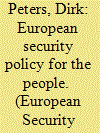

|
|
|
|
|
| Publication |
2014.
|
| Summary/Abstract |
The democratic foundations of European integration in the foreign and defence realm are increasingly being debated. This article looks at the question of democratic legitimacy from one particular angle, by examining public opinion as measured in Eurobarometer surveys between 1989 and 2009. Based on reflections about the relation between polling results and wider questions of democracy, it examines three aspects of public opinion: general support for a common foreign and a common defence policy; differences among support rates in EU member states; and what roles Europeans would prefer for European armed forces. It turns out that general support for a common foreign policy is high, whereas the desirability of a common defence policy is much more contested. Moreover, citizens across Europe would prefer European armed forces to take on traditional tasks, as territorial defence. An EU defence policy that goes beyond strict intergovernmentalism and is directed towards protecting international law and universal human rights would thus require a significant communicative effort to become accepted.
|
|
|
|
|
|
|
|
|
|
|
|
|
|
|
|
| 2 |
ID:
137626
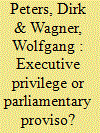

|
|
|
|
|
| Summary/Abstract |
Parliamentary oversight of the military constitutes an important element of the civilian control of the armed forces. However, the strength of parliaments in this realm varies greatly across democracies and little is known about the sources of this variation. We propose an explanation for one key aspect of this variation: why does parliament enjoy veto power over military deployments in some democracies but not in others? Our analysis of data from forty-nine democracies around the world suggests that at least three factors account for parliamentary strength or weakness in this realm: the external threat to which a country is exposed, its constitutional tradition, and the experience of severe military failure in the past.
|
|
|
|
|
|
|
|
|
|
|
|
|
|
|
|
| 3 |
ID:
145783
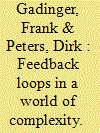

|
|
|
|
|
| Summary/Abstract |
Feedback in foreign policy occurs when a state's foreign policy affects the international context of that state and those changes in context subsequently impact on the state's future foreign policy decisions. In this way, feedback loops can develop, which may become self-reinforcing and in which foreign policy and international context continuously affect each other. Even though such processes are ubiquitous especially in a globalized world, they have hitherto received little systematic attention. We introduce cybernetics as a perspective that puts such feedback effects at the centre of attention and provides an accessible sequential framework for analysing them. Such a cybernetic analysis not only demonstrates the significance of feedback processes in foreign policies but also speaks to several recent debates in international relations theory and foreign policy analysis. In particular, it highlights processes of learning and change, of non-linearity and indeterminacy, and enables the researcher to integrate insights from structure- and agency-based approaches. We outline the merits of a cybernetic analysis by discussing the effects of feedback in the United States' War on Terror.
|
|
|
|
|
|
|
|
|
|
|
|
|
|
|
|
| 4 |
ID:
134065
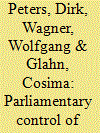

|
|
|
|
|
| Publication |
2014.
|
| Summary/Abstract |
Parliamentary involvement remains a key tool for the democratic control of executive policies. This article explores the web of parliamentary involvement in decision-making on European Union (EU) military operations, using insights gained in an in-depth case study on the EU's anti-piracy mission Atalanta. We find that parliaments at all levels became involved only after key political decisions had already been made. At the member state level, we find highly uneven involvement with only some parliaments being very well informed and closely monitoring, if not influencing government policy. The European Parliament became active only after the launch of the mission but then scrutinised it intensely, profiting (in contrast to national parliaments) from its access to top military officials and key decision-makers. Finally, transnational parliamentary assemblies as well as more informal networks provided opportunities to transmit information across the boundaries of individual parliaments and party-groups thus potentially enhancing the ability of parliamentarians to scrutinise government policies.
|
|
|
|
|
|
|
|
|
|
|
|
|
|
|
|
| 5 |
ID:
165909
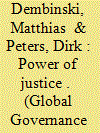

|
|
|
|
|
| Summary/Abstract |
Complaints about “double standards” in global governance are widespread. When governments from the Global South criticize powerful Western states for applying double standards in implementing norms such as international criminal justice, this is usually taken to indicate that they disagree with the substance of these norms. In contrast, this article argues that the criticism can also be understood as expressing dissatisfaction with the procedures for applying those norms. Based on insights from empirical justice research in social psychology, the article highlights the significance of procedural fairness for the legitimacy of institutions and illustrates the importance of concerns about procedural unfairness in recent complaints about the International Criminal Court (ICC) by African governments.
|
|
|
|
|
|
|
|
|
|
|
|
|
|
|
|